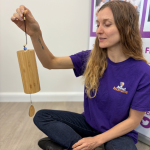
They’re not ‘too sensitive’ – they’re trying to cope
August 18, 2025
Calm corners at home and school: Why space to reset matters
September 4, 2025The new school year is underway – uniforms are in use, mornings are earlier, and homework is making its return. But beyond the logistics, the first few weeks back can be an emotional adjustment for children, and how they settle now can shape their wellbeing for the months ahead.
Keep routines steady
Sleep, structure and mealtimes matter more than new stationery. If summer bedtime habits linger, it is not too late to ease into a healthier rhythm. Consistent sleep and regular mealtimes help restore balance, focus and mood. Mornings do not have to be frantic – preparing lunches and clothes the night before can make a big difference.
Small after-school rituals, like a short walk or quiet time before the evening begins, help children reset after a full day.
Movement to boost mood
Returning to the classroom means more sitting, so movement becomes even more important. A walk home, a quick dance in the kitchen or a stretch before dinner can help release tension and improve focus. These small bursts of activity regulate stress hormones and support both physical and emotional health.
Make space for feelings
Even after the first week or two, nerves and overwhelm can still be bubbling under the surface. Asking open questions like, “What was tricky today?” or “What made you smile?” encourages reflection without pressure.
When we respond with empathy (“That sounds frustrating”) instead of rushing to fix it (“Don’t worry about it”), children feel heard and understood.

Support their mental readiness
Starting a new school year is not just about learning – it is about adapting. New teachers, routines and classmates can be a lot to take in. Keep talking about what to expect, and remind children it’s okay if they are still finding their feet. Emotional readiness builds over time, not overnight.
Notice the quiet signs
Some children show their stress loudly, others quietly. Look out for changes in behaviour – low energy, irritability, reluctance to talk about school, or physical complaints like headaches or stomach aches. These can be signals they need extra support, even if they do not say so directly.
Offering a calm space to chat after school, or simply being present, can make a difference.
Keep connections strong
Friendships are a key part of feeling settled at school. Encourage your child to reconnect with friends or join activities that interest them. A sense of belonging is one of the strongest protectors of wellbeing.
Simple reminders like, “Lots of people feel this way after a change,” can help children feel less alone.
Make it a fresh start
A new term can also be a time for new beginnings. Framing this as a fresh chapter helps children view the return to school as an opportunity, not a hurdle.
As parents and carers, modelling this attitude matters too. Sharing how you manage your own adjustments shows that learning to adapt is a lifelong skill.
Mind Marvels tip: End-of-day reset
Choose a short ritual to mark the shift from school to home – a few deep breaths together, a stretch, or sitting quietly for a minute. This small transition can help both children and adults feel more present and ready for the evening ahead.
If your school is looking for practical wellbeing support that lasts beyond the session, explore Mind Marvels here at mindmarvels.com.
